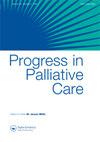National survey of sibling support services in children’s hospitals
IF 0.9
Q4 PUBLIC, ENVIRONMENTAL & OCCUPATIONAL HEALTH
引用次数: 2
Abstract
Nearly a quarter-million children are siblings to children living with serious illness. Intense physical, emotional, social and psychological concerns are introduced when a brother or sister is diagnosed with a serious illness or disease. Support services for siblings are critical to promote positive outcomes and decrease negative consequences and align with parents’ desires to support all of their children. These include services offered to the sibling or family to provide comfort or enhance the quality of life during a child’s serious illness. Despite national standards, sibling support services are often difficult for families to access. The aim of this study was to describe sibling support activities provided through teaching children’s hospitals across the United States using a cross-sectional, descriptive design. Results indicate most hospitals surveyed offer sibling support services that focus on sibling education about the illness; parent education on how to anticipate the siblings needs; and activities for families to do together, yet face barriers to delivery. Services focused directly on siblings and actively supporting their adaptation were least often provided and less than half reported screening siblings for psychosocial distress. Findings suggest that sibling support services may be an important resource to minimize distress and promote adaptation for siblings. This description of current and available sibling support services is an important starting point for enhancing services, policies, and institutions that fully envelope siblings into patient- and family-centered care.全国儿童医院兄弟姐妹支持服务调查
近25万儿童是患有严重疾病的儿童的兄弟姐妹。当兄弟姐妹被诊断患有严重疾病时,会引起强烈的身体、情感、社会和心理问题。为兄弟姐妹提供支持服务对于促进积极成果、减少负面后果以及符合父母支持所有孩子的愿望至关重要。其中包括为兄弟姐妹或家庭提供的服务,以在儿童患重病期间提供安慰或提高生活质量。尽管有国家标准,但家庭往往很难获得兄弟姐妹支持服务。本研究的目的是通过横断面描述性设计描述美国各地儿童医院通过教学提供的兄弟姐妹支持活动。结果表明,大多数接受调查的医院提供兄弟姐妹支持服务,重点是兄弟姐妹对疾病的教育;关于如何预测兄弟姐妹需求的家长教育;以及家庭一起进行的活动,但在交付方面面临障碍。直接关注兄弟姐妹并积极支持其适应的服务提供的频率最低,不到一半的报告称对兄弟姐妹进行了心理痛苦筛查。研究结果表明,兄弟姐妹支持服务可能是减少兄弟姐妹痛苦和促进兄弟姐妹适应的重要资源。对当前和可用的兄弟姐妹支持服务的描述是加强服务、政策和机构的重要起点,这些服务、政策、机构将兄弟姐妹完全纳入以患者和家庭为中心的护理中。
本文章由计算机程序翻译,如有差异,请以英文原文为准。
求助全文
约1分钟内获得全文
求助全文
来源期刊

PROGRESS IN PALLIATIVE CARE
PUBLIC, ENVIRONMENTAL & OCCUPATIONAL HEALTH-
CiteScore
2.60
自引率
11.80%
发文量
24
期刊介绍:
Progress in Palliative Care is a peer reviewed, multidisciplinary journal with an international perspective. It provides a central point of reference for all members of the palliative care community: medical consultants, nurses, hospital support teams, home care teams, hospice directors and administrators, pain centre staff, social workers, chaplains, counsellors, information staff, paramedical staff and self-help groups. The emphasis of the journal is on the rapid exchange of information amongst those working in palliative care. Progress in Palliative Care embraces all aspects of the management of the problems of end-stage disease.
 求助内容:
求助内容: 应助结果提醒方式:
应助结果提醒方式:


